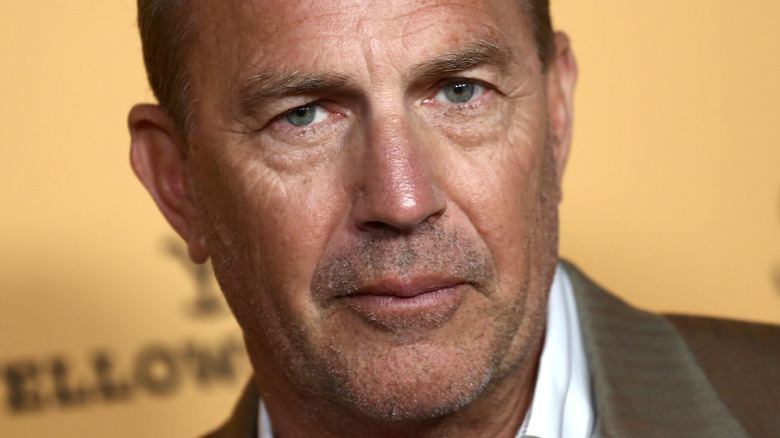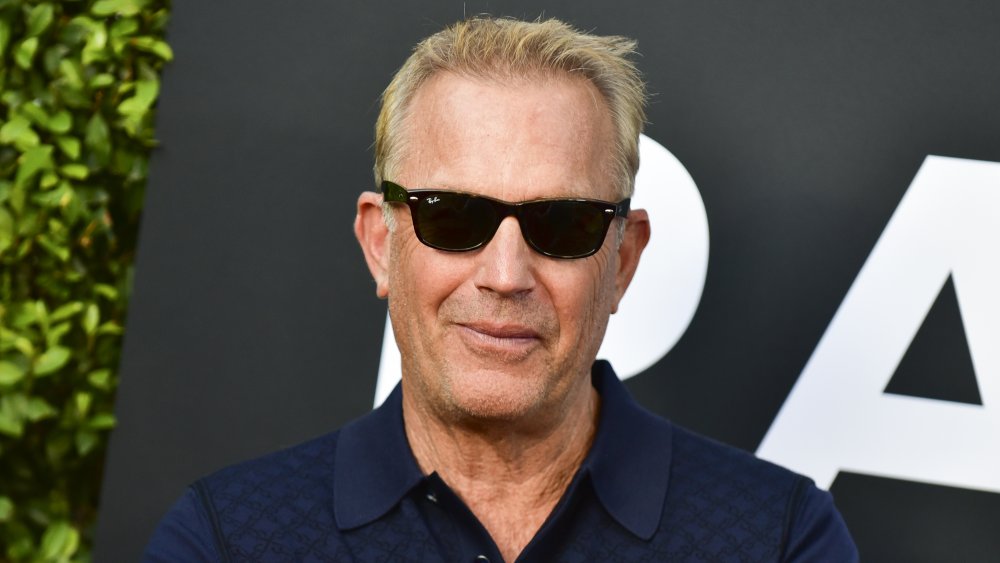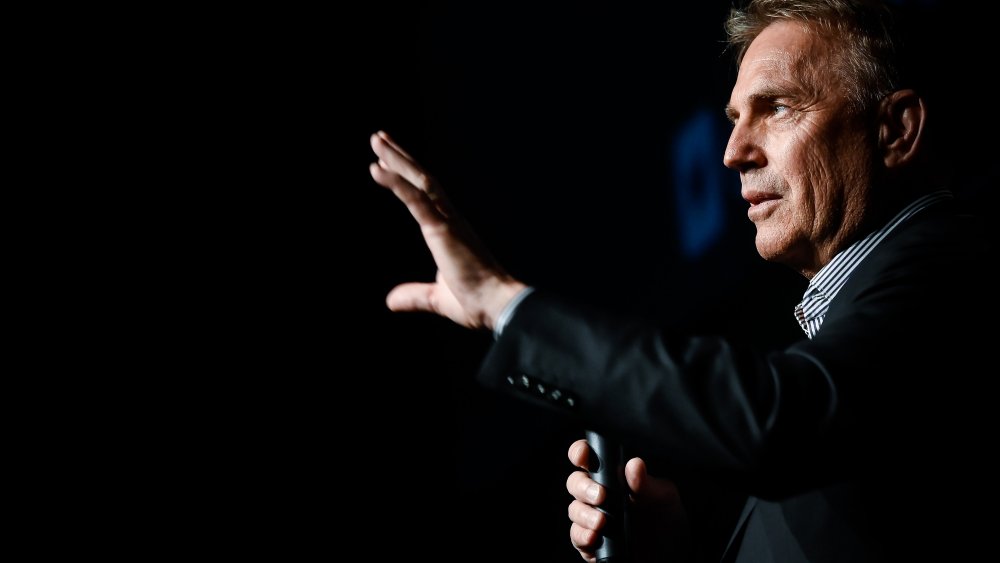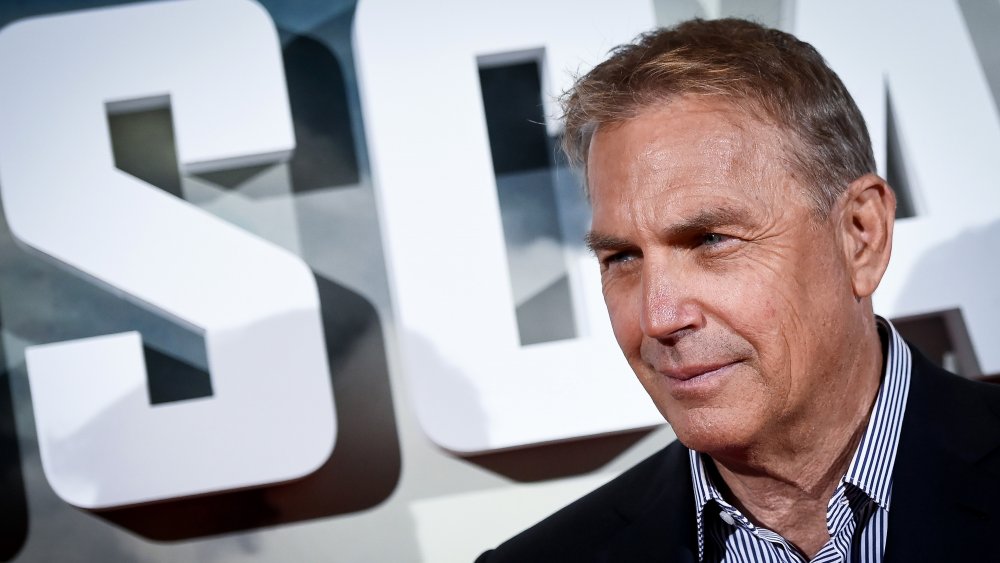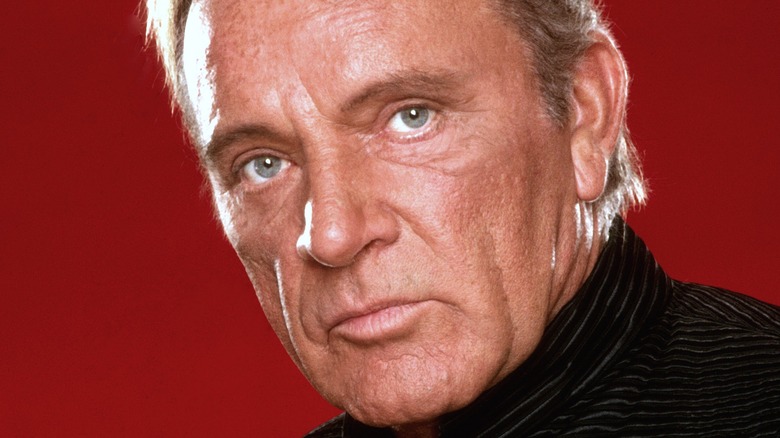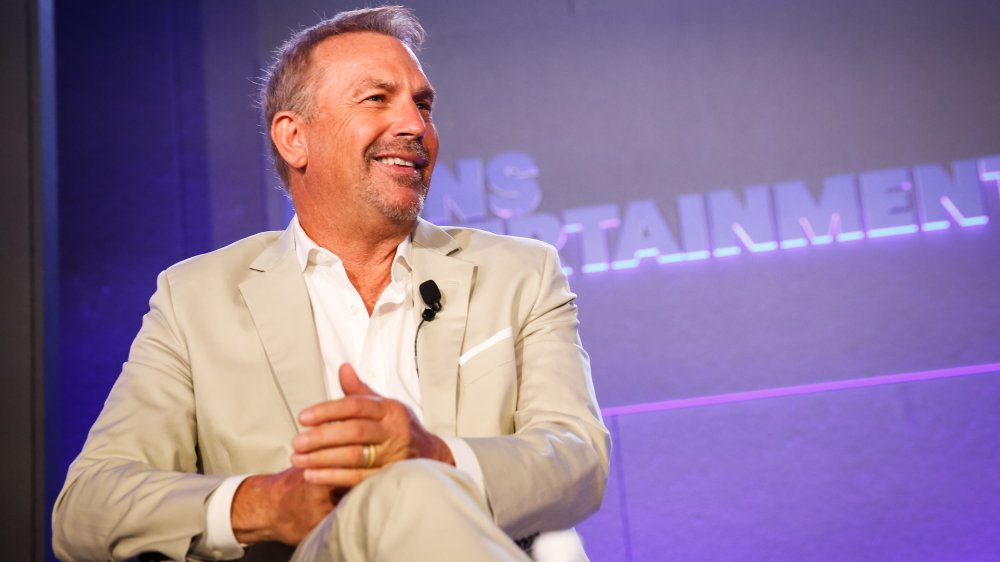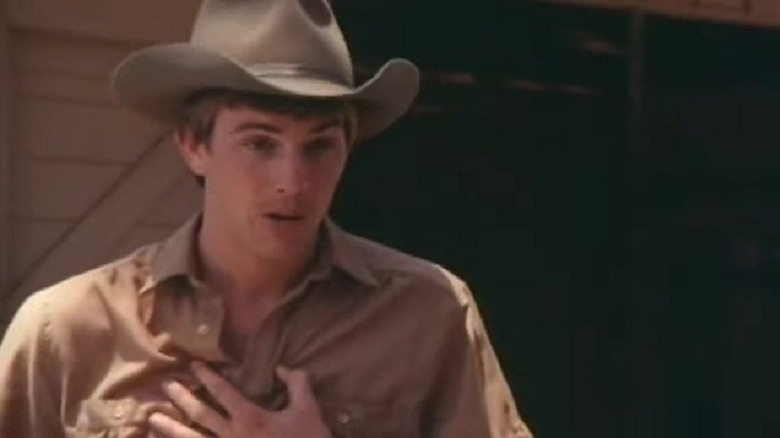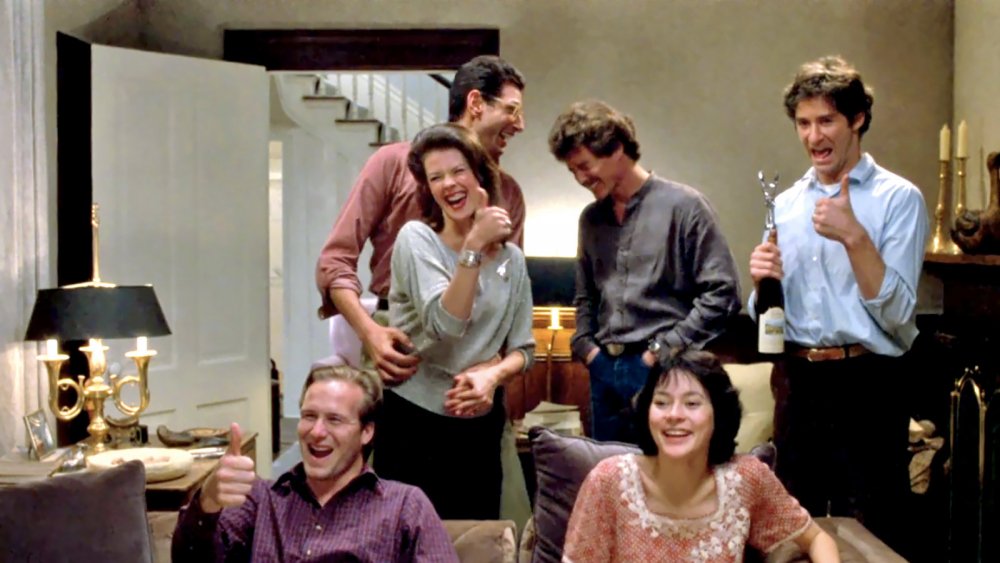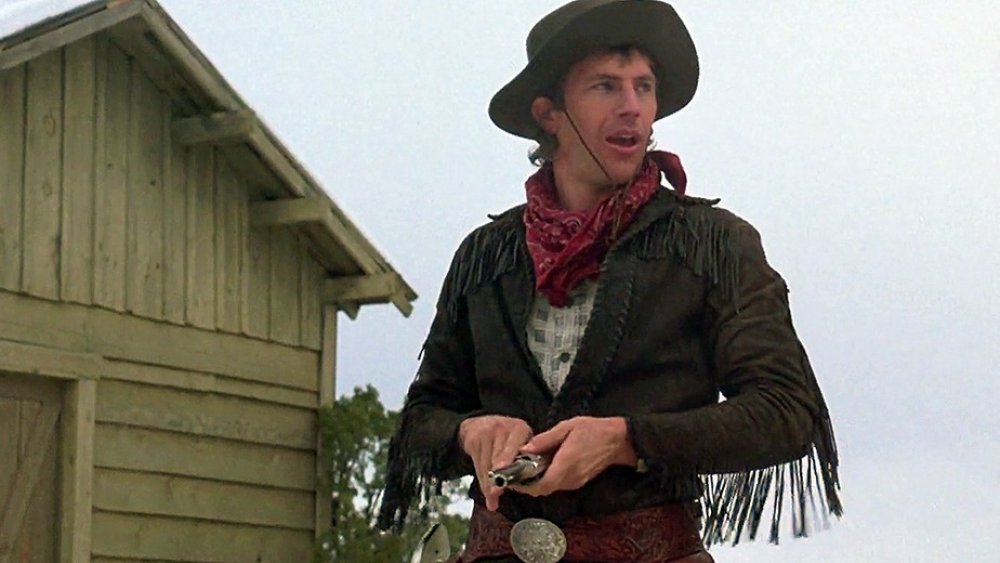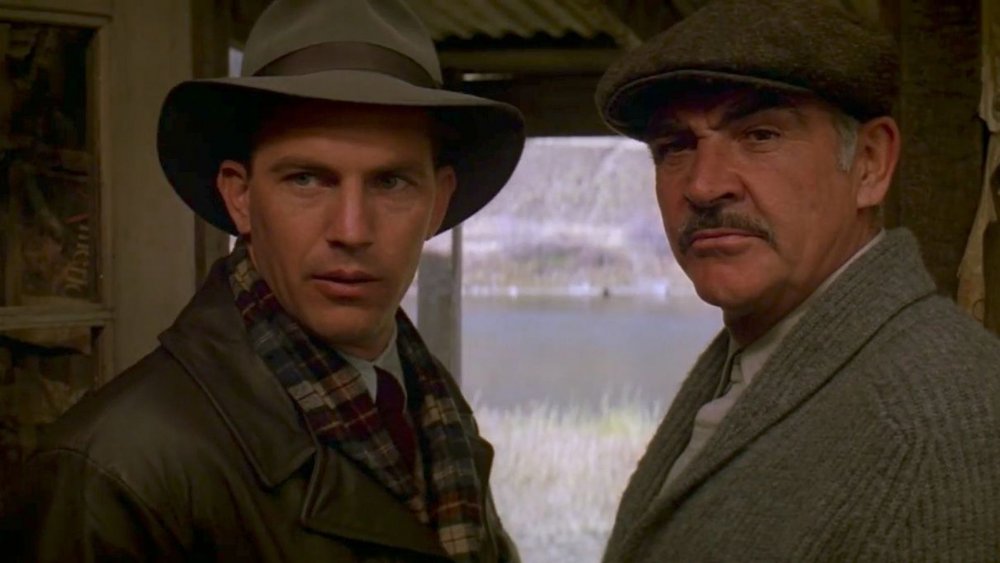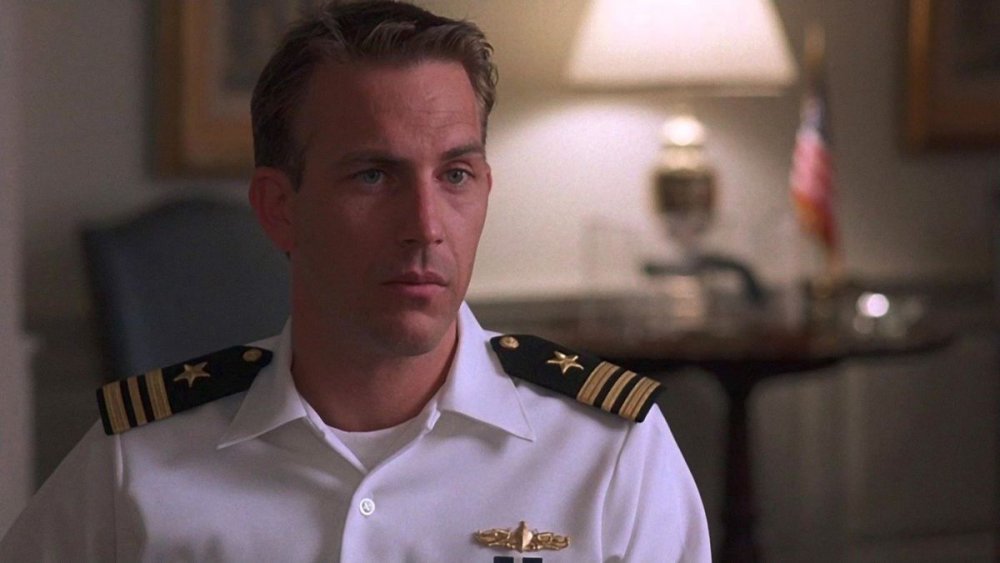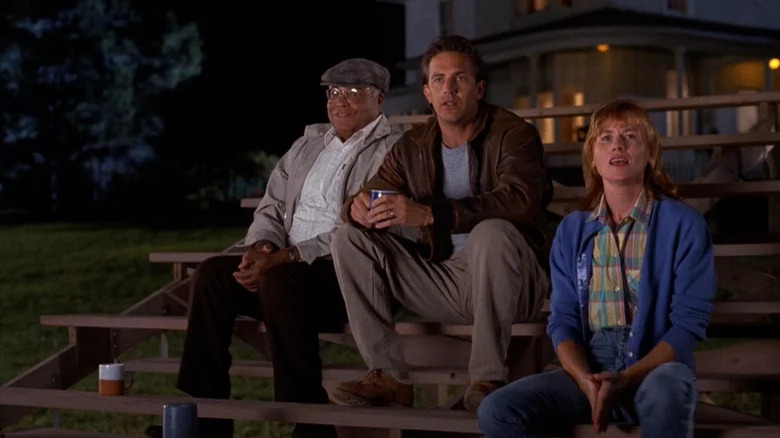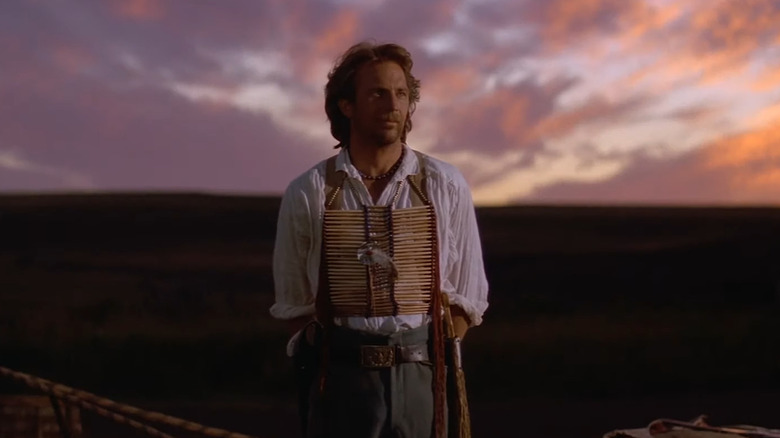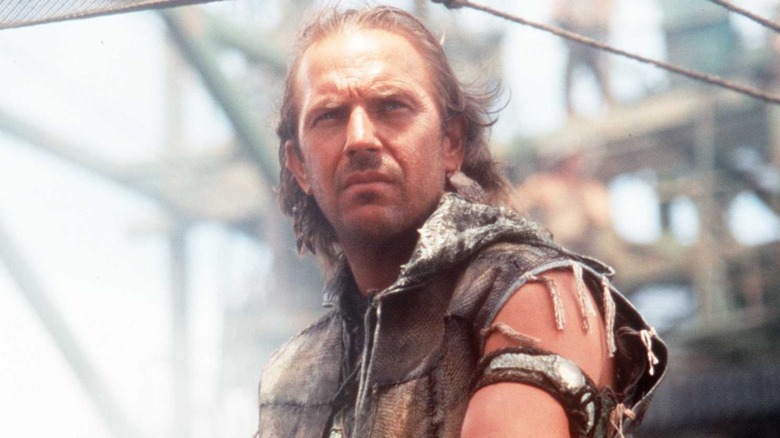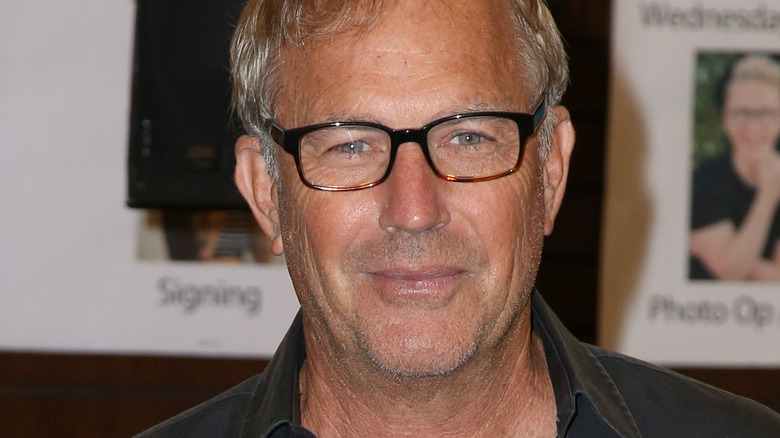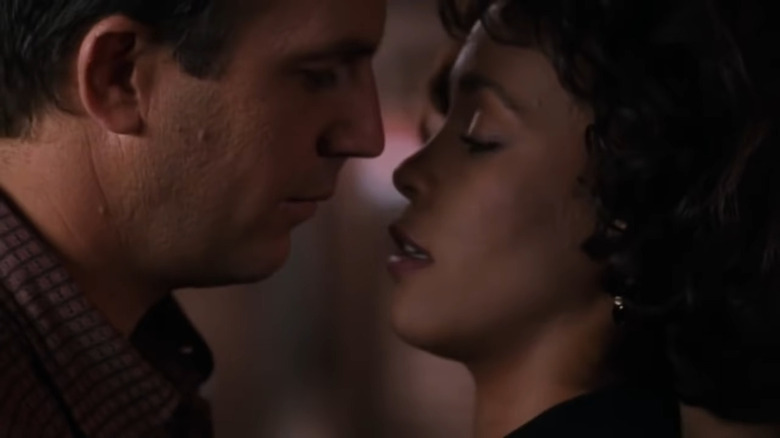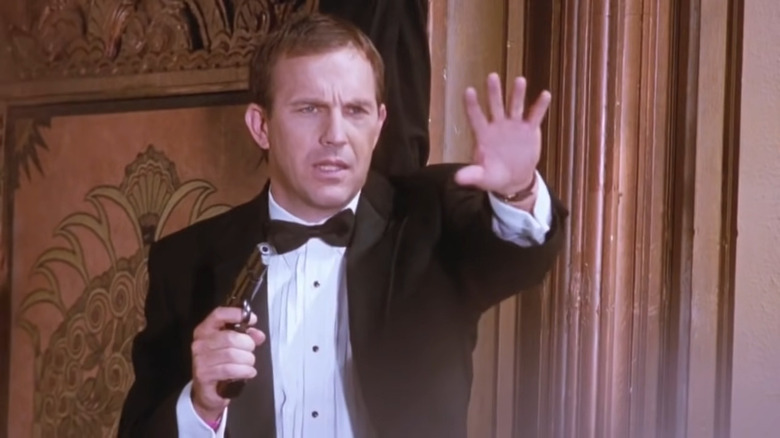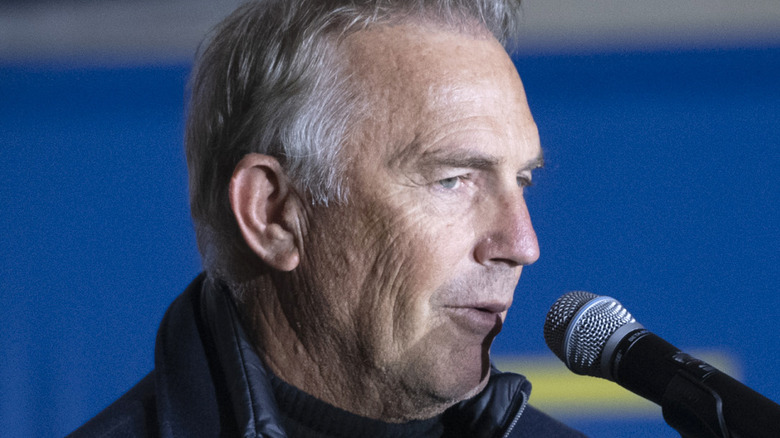The Untold Truth Of Kevin Costner
Today, television audiences know Kevin Costner as John Dutton on the hit drama series "Yellowstone," but back in the 1990s, the man was everywhere. After getting his start as an extra on low-budget films, he moved to bigger fare with blockbuster movies like "No Way Out," "Field of Dreams," and the Oscar-winning "Dances with Wolves." And the man has had some serious staying power. After the double whammy of "Waterworld" and "The Postman" — massive flops that could've easily tanked his career for good — Costner picked himself up and dusted himself off, and today, he's wowing audiences all over again with his impressive "Yellowstone" performance over on the Paramount Network.
But how did Costner go from working odd jobs in Los Angeles and auditioning for bit parts to winning Oscars and playing in all-time classics like "The Untouchables," "JFK," and "Bull Durham?" And what sparked his sustained interest in Western epics and baseball flicks? Well, as it turns out, his journey to Hollywood stardom is basically an example of the American dream in action. Here's how Kevin Costner went from feeling like a teenage misfit to becoming one of the most bankable leading men in the entertainment industry.
Kevin Costner felt like an outcast as a child
Kevin Costner attended several different schools as a teenager, and as a result, he always felt like a bit of an outcast. Repeatedly forced to start over with a new set of teachers and peers, he struggled to find his social circle and identify his own strengths. "Along the way, I kind of lost what my own real identity was," Costner told Rolling Stone. "Like, 'Well, who am I? Just some guy who goes to a new school and, god, wants to just have a couple of friends?"
But growing up, he always had a strong interest in the arts. His parents were rather strict, so he did his best to stay out of trouble, and he excelled at a few different hobbies. Costner enjoyed writing poetry in his spare time. He also sang in a Baptist choir. While some actors knew that they wanted to be in front of the camera at a young age, Costner didn't have that clear vision of his future just yet, but he definitely had a creative streak that was always evident.
He loved going to the movies
Growing up, Kevin Costner always did have a love for the movies. Granted, he had no idea that he would be starring in films of his own one day, but he often found himself getting lost in the great ones. There were a few movies that made a particularly profound impact on him.
Costner has stated that the classic film "How the West Was Won" "formed" his childhood. "The impression for me, hearing Spencer Tracy and watching CinemaScope and seeing Jimmy Stewart in that canoe was so strong that it got into my nostrils," Costner said in an interview with Roger Ebert. "I actually went ahead and built three canoes in my life. I traveled the rivers of Lewis and Clark when I was out of high school."
Costner also sought out other Western films. He loved "Red River" and "The Searchers," both of which are considered two of John Wayne's best films. He always felt a connection to this time period in American history, and it influenced his choice of acting roles as his career got off the ground — as well as the types of projects he was inclined to select as his star rose in Hollywood and he acquired the type of clout it takes to make major movies happen through sheer force of will.
Kevin Costner wanted to spend his life telling great stories
After graduating from high school, Costner began studying business at California State University, Fullerton. But as the years went on, he still felt like he wasn't connecting with the people around him, and he eventually realized that business wasn't his true calling after all.
"As I approached my senior year, I had a real talk with myself about what I wanted to do and whether I just wanted to please other people," Costner recalled while speaking with Rolling Stone. "And it was at that moment that I actually said to myself, 'I'm interested in storytelling.'"
Looking back, Costner described the way the moment he realized he wanted to be an artist, regardless of what anyone else thought, was very liberating. "If you want to look at a high point in my life, it wasn't a movie," he said, continuing, "It was that internal talk I had with myself, where I said ... 'I am going to go where my heart wants to go.'"
Richard Burton encouraged him to pursue acting
Although Kevin Costner eventually decided what path he wanted to take, he still felt that he needed some encouragement. After all, pursuing an acting career is a major risk, and he worried about whether or not he really had what it took to succeed in Hollywood. But a chance encounter with Academy Award-winning actor Richard Burton ("Who's Afraid of Virginia Woolf?," "The Spy Who Came in from the Cold," "Cleopatra") gave Costner the confidence he needed to go after his dreams.
Costner and his wife were catching a flight home on their way back from their honeymoon when the newlyweds noticed that Burton was also seated on their plane. Costner was nervous to approach the actor to ask for his advice, but he decided to go for it anyway ... and he was relieved when Burton was supportive of Costner's ambitions. "I desperately wanted to talk to him," Costner told Yahoo! Entertainment. "The conversation never really expanded other than there was a gentleness and a kindness and looking at me saying, 'I think you should try this.'" This was just what Costner needed to hear, and after receiving this bit of affirmation, he finally felt confident that he could make a living as an actor.
Kevin Costner's early days in Hollywood
Like many aspiring actors, Kevin Costner wasn't exactly rolling in dough during the early days of his career. When he had that pivotal conversation on the plane with Richard Burton, he was working in marketing, and as he invested more and more time into his acting career, he took on odd jobs to pay the bills while going on auditions. He had absolutely no connections in the entertainment industry, so he genuinely started from the bottom, and he had to learn how to navigate the business all on his own.
Costner was getting his career off the ground before everyone had a cell phone in their pocket, and he admitted that he had a very unusual living arrangement and a very unique way of learning whether or not he'd landed a gig. "When I decided that I was going to be an actor, no one gave me a chance. I certainly didn't know how it worked," Costner said in an interview with The Independent. "I used to drive my truck in every day to La Brea and Sunset and park by a phone booth and just go to sleep in my truck because I didn't know what else to do."
Landing his first roles
Eventually, Kevin Costner began landing some small roles in movies. He made his professional acting debut in the indie film "Sizzle Beach, U.S.A." (alternatively titled as "Malibu Hot Summer"), playing the owner of a horse stable in Malibu who has a fling with a summer tourist. And he followed that up with a bit part as a frat boy in "Night Shift." Of course, his unnamed character doesn't exactly play a huge role in the film, but at this stage of Costner's career, he was grateful for any opportunity to get in front of the camera.
In 1982, Costner also made a brief, uncredited appearance in the film "Frances." Sure, he wasn't a household name just yet, but in the early 1980s, Costner was finally starting to get his foot in the door and make some connections. These minor roles weren't especially impressive, but he was making some progress.
His scenes were cut from The Big Chill
Eventually, Costner landed the role of Alex in the film "The Big Chill." The events of the film are prompted by Alex's suicide, and initially, director Lawrence Kasdan intended to include footage of Alex in the movie, despite the fact that the plot takes place after his death. Although he wasn't supposed to have too much screen time in comparison to the other actors, this was a meaningful role for the up-and-coming Costner.
Unfortunately, Costner's scenes actually ended up on the cutting room floor, and his character didn't end up making an appearance in the final cut of the film at all, other than a quick shot of his slashed wrists. However, Kasdan saw something in Costner. Costner didn't know it, but he was about to get an opportunity that was much bigger than his part in "The Big Chill." Kasdan was planning to direct another film, a Western titled "Silverado," and he cast Costner in the starring role.
If you or anyone you know is having suicidal thoughts, please call the National Suicide Prevention Lifeline by dialing 988 or by calling 1-800-273-TALK (8255).
Starring in Silverado
In "Silverado," Costner played Jake, an exuberant gunslinger and one member of a group of misfit cowboys who end up chasing their fortunes to the town of Silverado, but if they want to strike it rich, they'll have to settle their scores with a corrupt rancher and the local sheriff. "Silverado" is the kind of Western movie that Costner loved to watch as a child, and it earned positive reviews from critics and brought Costner more publicity. In a review for The Moving Picture Show, critic Joe Leydon wrote, "Costner, a relative newcomer, gives an ingratiating performance that should mark him for bigger and better things."
Costner's working relationship with the film's director, Lawrence Kasdan (who also wrote "The Empire Strikes Back" and "Raiders of the Lost Ark"), opened up doors for him in Hollywood. In fact, 1985 turned out to be a big year for Costner. After the release of "Silverado," he went on to appear in the film "Fandango," and he was also on an episode of Steven Spielberg's TV series "Amazing Stories."
Kevin Costner impressed critics in The Untouchables
A couple of years after the release of "Silverado," Costner took his career to new heights with a starring role as Eliot Ness in the gangster thriller "The Untouchables." Costner agreed to take on the role of the real-life Prohibition agent because he was drawn to the strength of the screenplay, citing it as one of screenwriter David Mamet's best scripts. He was also offered the biggest paycheck of his life, as he was able to negotiate with Paramount for a $1 million salary for the film.
Directed by the great Brian De Palma ("Carrie," "Scarface"), The Untouchables co-starred the legendary Sean Connery and Robert De Niro, and Costner's instincts about the adventurous crime drama proved correct. The film was nominated for four Academy Awards, and critics noted his skillful performance. "'The Untouchables' could be the breakthrough movie for Kevin Costner, a folksy, Gary Cooperish actor who holds center stage as Eliot Ness," wrote critic Jay Boyar in a review for the Orlando Sentinel.
Working on "The Untouchables" was an invaluable learning experience for Costner. According to EW, Costner said that shooting the movie "continued to refine my idea of 'the script is the thing.'"
No Way Out was a career-defining role for Kevin Costner
In 1987, Costner starred as Navy lieutenant Tom Farrell in the crime drama "No Way Out," which finally established him as a true leading man. In this neo-noir thriller, Farrell has an affair with a young woman named Susan Atwell (Sean Young) ... who later turns up dead. Farrell knows that his superior, Defense Secretary David Brice (Gene Hackman), also had a fling with Susan, which complicates the mystery. Farrell is put in charge of figuring out who committed the crime, but as more clues are revealed, he worries that he might somehow be implicated.
Starring in "No Way Out" was a landmark moment for Costner's career. He wasn't just the big name of the moment — he'd proven that he could command the lead in a serious, gripping film, and he was well on his way to becoming one of Hollywood's A-listers. Although "The Untouchables" was received well by critics, "No Way Out" earned even higher praise, particularly in regards to Costner's role. In fact, Roger Ebert stated that Costner's performance was "a lot more interesting and complex than his work in 'The Untouchables.'" Of course, while we'll definitely defend Costner's performance in Brian De Palma's gangster flick, there's no denying the actor was improving with each film.
He's starred in a lot of baseball movies
Early in his career, Kevin Costner had already appeared in the baseball movie "Chasing Dreams," but in the late 1980s, his starring roles in the successful films "Bull Durham" and "Field of Dreams" created an enduring association between the actor and the sport of baseball. Later, he also took on roles as a baseball player in two other films, "For the Love of the Game" and "The Upside of Anger."
As you've probably guessed, Costner does have a personal love for baseball, and he's always been a huge fan of the sport. In fact, he owns a ranch in Aspen, where he enjoys bringing his friends and family together to play the national pastime. "I built a real baseball diamond there, and I have a lot of friends come out and play," Costner told The Denver Post. "I have friends connected to NCAA baseball teams, so they come on out to the field." Costner has shared that he enjoyed playing baseball with his dad growing up, and his father definitely influenced his passion for the sport.
The movie that won Kevin Costner an Oscar
Kevin Costner saw the most important achievement of his career with "Dances with Wolves," an epic Western that he directed and starred in. In this 1990 drama, Costner played Union Army lieutenant John J. Dunbar, who's sent to a remote outpost of the American frontier and begins living with a Lakota tribe. He decides to leave his previous life behind to become a part of the tribe, but when other Union soldiers arrive with plans for their land, he finds himself in a dangerous position.
Critics lauded the film for revitalizing the Western genre without resorting to cliches. "While violating almost every Hollywood taboo, Costner has restored some of its most cherished traditions," Brian D. Johnson wrote in a review for MacLean's. "He has created an adventure with hot-blooded action, breathtaking scenery and a noble theme — a spectacle with the sort of wide-screen grandeur that has become almost extinct."
Funnily enough, Costner said that he originally didn't want to be in the director's chair, but no one else seemed to understand the script the way he did. "I never had a burning desire to direct," Costner told The New York Times. "But everyone I showed the script to knew what the film didn't need, what should be cut. But I knew this was a three-hour film." "Dances with Wolves" ended up solidifying Costner's career and earning 12 Academy Award nominations and seven wins, with Costner being awarded Best Director over legends like Martin Scorsese and Francis Ford Coppola.
Why Kevin Costner turned down The Shawshank Redemption and Air Force One
As one of the most popular actors of the 1990s, Kevin Costner made a lot of movies, and subsequently, he was usually at the top of most movie studios' casting lists. But there's only so much time in a year, so Costner couldn't star in every film offered, forcing the actor to make some hard choices.
According to Far Out, Costner was the producers' first choice for the role of Andy Dufresne, the convicted murderer yearning to break free from prison in "The Shawshank Redemption." The film would eventually go on to be a critically acclaimed modern classic ... but without Costner. When he was asked to play Andy, he was making "Waterworld," a futuristic sci-fi epic riddled with messy production difficulties. Costner helped oversee the "Waterworld" shoot and thus had to pass on "The Shawshank Redemption," and so the part went to Tim Robbins.
A few years later, Costner would once again be mired in the arduous production of an expensive sci-fi epic, the 1997 box office bomb "The Postman." That year also saw the release of "Air Force One," in which the president of the United States fights off airplane hijackers. Harrison Ford played the president in the blockbuster, but he wasn't filmmakers' first choice. "This was a script that Kevin Costner originally had and he gave it to me," Ford told the Los Angeles Times, adding that, "His schedule didn't allow him to do it."
Kevin Costner is an author
More than an actor, Kevin Costner is also a content creator. He co-wrote the upcoming 19th century-set Western epic "Horizon" and developed HearHere, a narrated history and travel app.
Costner also added "author" to his extensive resume in 2015 with his first published work of full-length fiction, "The Explorers Guild: Volume One: A Passage to Shambhala." A graphic novel illustrated by Rick Ross and co-authored with frequent collaborator Jon Baird, Costner's story takes place during World War I and concerns a secret league of daring adventurers who travel the world in search of a golden city spoken about in Buddhist legends. Kirkus Reviews called the first of possibly many entries in "The Explorers Guild" "a rousing throwback whose spinning plates never stop, even at the end."
Costner also contributed words of wisdom and life lessons he's learned to "Tools of Titans: The Tactics, Routines, and Habits of Billionaires, Icons, and World-Class Performers," an anthology spearheaded by self-help author Tim Ferriss.
He's responsible for a major contribution to The Bodyguard
Kevin Costner was one of the most bankable movie stars of the early '90s, starring in a string of massively successful and quite different box office hits, including "JFK," "Robin Hood: Prince of Thieves," "Dances with Wolves," and "The Bodyguard." Costner also served as a producer on the latter three, so he had a say in determining how those films both came together and were properly executed.
As for "The Bodyguard," the romantic drama about the ill-fated love between a pop star and her muscle was a starring vehicle for Costner, but it would also launch the film career of real-life singing sensation Whitney Houston. She sings several songs in the movie, and early on in the project, soundtrack producer David Foster planned for Houston to sing a cover of "What Becomes of the Brokenhearted," a pop standard and 1966 hit single for Motown act Jimmy Ruffin. However, not everyone was crazy about the song, including Foster himself.
"My heart wasn't in it," Foster said of the song to Rolling Stone, adding that Houston wasn't sold either. So Foster called Costner and mentioned that "The Bodyguard" would need a different showcase song. A day passed, and Costner recommended Houston record a new version of Dolly Parton's 1970s country ballad "I Will Always Love You." Costner's suggestion worked out. Houston's cover of "I Will Always Love You" spent 14 weeks at #1 on the Billboard pop chart.
Why The Bodyguard 2 never happened
Released in the fall of 1992, "The Bodyguard" was such a massive hit — $410 million at the global box office and featuring one of the best-charting soundtracks ever (per Billboard) — that a sequel was almost a foregone conclusion, from a business standpoint. However, because the movie's central romantic characters don't wind up together, any future "Bodyguard" movie seeking to recreate the original's formula would have to pair off the pop star or bodyguard with a new person.
According to PeopleTV, Kevin Costner (not Whitney Houston) was set to be the actor returning for "The Bodyguard 2," and he approached a very famous person with little acting experience to star as his on-screen lover: Princess Diana of the United Kingdom. Costner considered making the movie from the get-go with Diana in his head, and he spoke to her on a few occasions, with the talks set up by Sarah Ferguson, the Duchess of Wales.
Costner received the screenplay for "The Bodyguard 2" in August 1997. Tragically, the very next day, Princess Diana died in a car accident at age 36, and so the movie never entered production.
His politics are complicated
According to Variety, the most-watched scripted show on television in the 2021-2022 season was "Yellowstone," Paramount Network's soapy saga about a ranch-owning family in Montana. In real life, Montana is a predominantly Republican "red state," and "Yellowstone" characters exhibit staunchly conservative traits, thus creating the association that star Kevin Costner is a Republican too — an assumption that was also widely made about the actor in the late 1980s and early 1990s, according to The Daily Beast. After all, Costner publicly backed GOP presidential candidate George Bush in 1988, per the Los Angeles Times, and he was friendly with Republican president Ronald Reagan.
But Costner's political leanings are far more nuanced than that. "I'm an independent. I vote for who I think has the best interests of the country and how we sit in the world," Costner told The Daily Beast, adding, "The Democratic Party doesn't represent everything that I think, and neither does the Republican Party right now — at all." In 2020, Costner supported Pete Buttigieg in the 2020 Democratic primaries and endorsed Joe Biden in the general election (per Variety).
